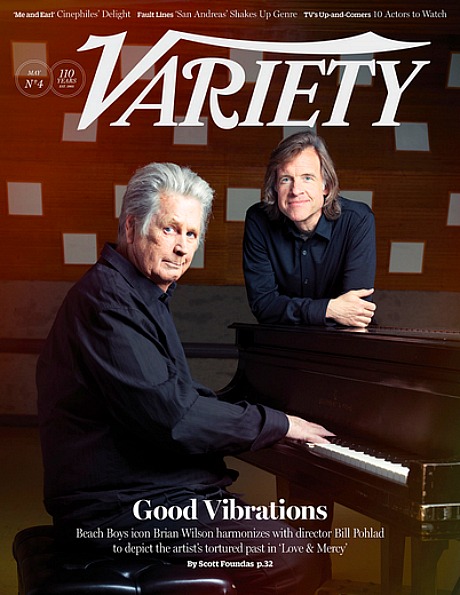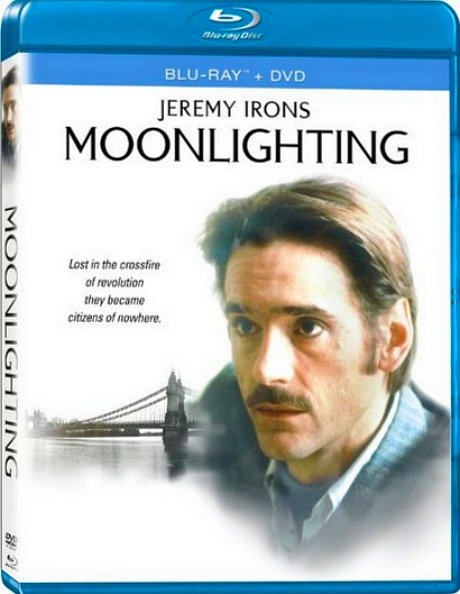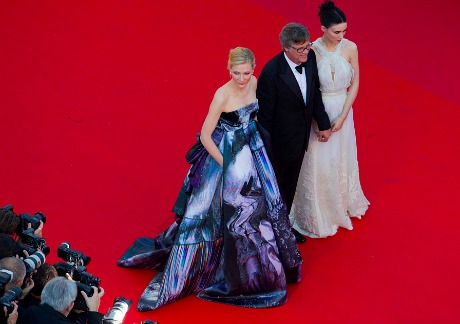Daily
Talk It All Through
In a 1.24.15 review from the 2015 Sundance Film Festival, N.Y. Post critic Kyle Smith called James Ponsoldt‘s The End of the Tour (A24, 7.31) “by far the most moving and profound odd-couple buddy movie [to play here], with a funny, lightly intellectual script by Pulitzer Prize winning dramatist Donald Margulies that should merit heavy awards consideration. Falling halfway between Almost Famous and My Dinner with Andre, this love song to the art of conversation is about a Rolling Stone journalist, David Lipsky (Jesse Eisenberg) who is infatuated with the postmodernist novelist David Foster Wallace’s gargantuan novel ‘Infinite Jest’ and begs for the opportunity to profile the author, who’s about to leave his snowbound rural home in Illinois for a five-day book tour to Minneapolis.” I tried to fit this film into my Sundance schedule but stuff got in the way. It wasn’t for lack of trying. Okay, maybe I didn’t try hard enough on some level. Maybe I don’t relate all that well to guys who who have trouble controlling their appetites or who live in Illinois or who off themselves. But I wanted to see it. Want to, I mean.
When All Else Fails
Consequence of Sound’s Michael Roffman, filed on 3.16.15: “Not since Anton Corbijn’s Control, his excellent 2007 retelling of the life and death of Ian Curtis and Joy Division, has a biopic felt so authentic and conditional of its own subject. Screenwriters Oren Moverman and Michael Alan Lerner lean heavily on a number of must-read bookmarks in Brian Wilson’s career, but [director Bill] Pohlad adds a surreal touch, capturing the ’60s druggy landscapes and Wilson’s manic inner voices with dreamy perspectives Love & Mercy leaves the darkest hours of Wilson’s life — his weight gain, his drug abuse, and his rigorous early therapy sessions alongside Eugene Landy — for the imagination or extra-curricular studies. The film has enough struggles to resolve, specifically how Wilson’s love for music nearly crushed him, and how love eventually saved him. The way Pohlad orchestrates this strange dichotomy on-screen is about as beautiful and heartwarming as any of The Beach Boys’ best material. And when your favorite songs bubble up or weave through Atticus Ross’s unique score, the marriage of sound and screen will win your tears, your smiles and your soul. To paraphrase Wilson, that’s what you need tonight.”

Uncle Bernie By A Country Mile
I’ll grudgingly vote for Hillary Clinton in the end, but I don’t like her that much. She’s okay in a corporately liberal, center-right sort of way, and like everyone else I love the idea of a woman succeeding Barack Obama. But I really love who Bernie Sanders is — a man of balls and integrity and blunt truths. I would honestly prefer that he become the next President, or someone like him. But he’s the guy — he’s it. He won’t beat Hillary in the primaries, of course, but for the time being and the foreseeable future I’m a total Bernie guy, and that means donating and wearing a Bernie for President T-shirt and all the rest of it. But I wish they would make European-style Bernie T-shirts like they do for women. I won’t wear a coarse, inelegant, low-thread-count T-shirt for any reason, Bernie Sanders included.


Cynical Surrender to San Andreas
Brad Peyton’s San Andreas (Warner Bros., 5.29) is exactly what the trailers have been selling — a serving of stupidly entertaining, over-the-top disaster porn that flirts with absurdity. Yes, everyone plays it totally straight and the script hits the usual predictable beats as the all-but-total destruction of Los Angeles, San Francisco and much of California is reduced to a story of six or seven people who show what they’re made of when push comes to shove. But it’s the very sincerity in which Peyton and his cast and FX team embrace this mudslide of cliches that makes it screamingly funny. Not “wow, these guys are really hilarious” funny but “wow, these guys will stop at nothing…they’ll push any button they can think of.” You just have to laugh or at least chortle.
After it’s all over at the very end we’re shown small groups of survivors holding hands and praying together along with a fence display of paper-mounted photos of possible survivors with messages asking if anyone has seen this or that person. We’re also shown a huge American flag being unfurled from the remnants of the Golden Gate Bridge. “You contemptible whores,” I muttered to myself. “You’re using memories and echoes of 9/11 to augment your finale, which you’re totally ‘sincere’ about. Serious balls, gentlemen…hats off.”
This is an appalling, never-boring, kill-the-world action film — a movie that goes beyond what any reasonable person would call a bogus, full-of-shit dramatic strategy to embrace something crazier and more meta. I’m not sure how to describe it except to say that San Andreas makes Irwin Allen‘s The Towering Inferno look like Elia Kazan‘s On The Waterfront. (If you’re fair about it you’ll acknowledge that Inferno was at least semi-realistic in its use of practical fire-fighting realities.) It’s not so much a “we will rock you” experience as one that says — boasts! — “we are the owners of this bullshit and we will fucking amaze you with our shamelessness.” And I submitted. I had to. I just shook my head and sat back in my 4DX chair and muttered, “Whatever, guys…go to town.”
The Men Must Not Know What I Know
You can stream Jerzy Skolimowski‘s Moonlighting (’82) but every now and then a Bluray comes along that you just want to own. Because on some level owning this or that title will make me feel good and affirmed. And because I want to re-experience the mesmerizing big-screen impact when this great allegorical film played during the 1982 New York Film Festival. I have it in my head that this British Bluray will somehow deliver a better facsimile than ever before. I love that moment when Jeremy Irons is lying on his bed and staring at a photo of his girlfriend (Jenny Seagrove) and suddenly she seems to come alive within the frame, very slightly and somewhat erotically. I’ve been remarking for years that the world is divided into two camps — those who hear Moonlighting and think of Bruce Willis and Cybil Shepard and those who think of Irons and Skolimowski and that ending with those shopping carts crashing into the wall.


Stranded, Despondent, Done For
Ridley Scott‘s The Martian (20th Century Fox, 11.25) is about Matt Damon somehow figuring out ways to survive on Mars for months on end despite being stranded with meager supplies of water and food. The film has a healthy roster of costars — Kate Mara, Jessica Chastain, Michael Peña, Kristen Wiig, Jeff Daniels — so it’s not some man-alone thing like Castaway or 127 Hours, but even if Damon’s ingenuity allows him to survive (and I’m presuming it will) I just don’t believe the U.S. government would spend God knows how many hundreds of millions (billions?) to send a rescue mission to save him. I think the powers-that-be would say, “We’re very sorry but every now and then you have to face reality and stand down and let nature take its course.” The film is based on Andy Weir’s book, which I’m not going to read as preparation.

If Bad Hurt Is So Good…
I’ve just finished reading a 5.24 Salon piece about an allegedly strong domestic drama called Bad Hurt, which played at last month’s Tribeca Film Festival but currently has no commercial distributor. Bill Curry‘s article, titled “Karen Allen’s brilliant comeback: A Raiders of the Lost Ark star forsakes Hollywood for a brilliant, blue-collar film,” describes Mark Kemble‘s film, an adaptation of his 2007 stage play called “Bad Hurt on Cedar Street,” as an American kitchen sink drama — “a good movie that felt very real.”
“American cinema never got into social realism,” Curry writes. “Italian neorealists like De Sica, Rossellini and Fellini had counterparts in British ‘kitchen sink’ auteurs such as Tony Richardson and Lindsay Anderson in new-wave film movements everywhere in the world but here. Such films show people trapped by income, education or family circumstance who don’t get rescued by upward mobility or the kindness of strangers. In America the idea of anyone being trapped in the system is heresy, but after 40 years of political and economic stagnation that may be starting to change.”
Son of Deep Tiki Poster Contest
With Cameron Crowe‘s Aloha opening three days hence with no buzz and no currents in the wind except those that spell dread, how much worse could the reception be if Crowe and Sony had adopted Hollywood Elsewhere’s pet title for this calamity, i.e., Son of Deep Tiki? Especially with certain native Hawaiians reportedly disapproving of the Aloha title, which they feel is “a disrespectful misappropriation of culture and simplifies a word that’s rich with meaning”? I’m asking anyone with modest Photoshop abilities to take a crack at a Son of Deep Tiki poster. I’ll post the best of the submissions. C’mon…it’ll be easy. The more subversive, the better.


Bygone Sensibilities
A few days ago and for no timely reason at all A.V. Club‘s Mike Vanderbilt posted a piece about original reactions to William Friedkin‘s The Exorcist, which opened in December ’73. It reminds you how jaded and cynical the culture has since become. The Exorcist gobsmacked Average Joes like nothing that they’d seen before, but you couldn’t possibly “get” audiences today in the same way. Sensibilities have coarsened. The horror “bar” is so much higher.
But there’s one thing that 21st Century scary movies almost never do, and that’s laying the basic groundwork and hinting at what’s to come, step by step and measure by measure. Audiences are too impatient and ADD to tolerate slow build-ups these days, but Friedkin spent a good 50 to 60 minutes investing in the reality of the Exorcist characters, showing you their decency and values and moments of stress and occasional losses of temper, as well a serious investment in mood, milieu and portents. It had the trappings of class — a genuinely eerie score, flush production values and the subdued, autumnal tones in Owen Roizman‘s cinematography. It was only in the second hour that the shock-and-awe stuff began.
The best parts of The Exorcist don’t involve spinning heads or pea-soup vomit. I’m talking about moments in which scary stuff is suggested rather than shown. The stuff you imagine might happen is always spookier.
Such as (1) that prologue moment in Iraq when Father Merrin (Max Von Sydow) is nearly run over by a galloping horse and carriage, and a glimpse of an older woman riding in the carriage suggests a demonic presence; (2) a moment three or four minutes later when Merrin watches two dogs snarling and fighting near an archeological dig; (3) that Washington, D.C. detective (Lee J. Cobb) telling Father Karras (Jason Miller) that the head of the recently deceased director Burke Dennings (Jack McGowran) “was turned completely around”; (4) Karras’s dream sequence about his mother calling for him, and then disappearing into a subway; (5) that moment when Regan MacNeil (Linda Blair) mimics the voice and repeats the exact words of a bum that Karras has recently encountered — “Can you help an old altar boy, father?” My favorite bit in the whole film is that eerie whoosh-slingshot sound coming from the attic.
Will Weinsteiners Downplay Rooney Mara’s Cannes Triumph By Running Her As Supporting Actress?
One of my early reactions after seeing Todd Haynes‘ Carol was that costars Cate Blanchett and Rooney Mara, who play closeted lovers in this 1952 Manhattan-based tale, are evenly matched in every sense of the term — neither dominates the other in terms of passion or screen time, and both parts are equally important. But conventional thinking says that the Weinstein Co. campaigning Blanchett vs. Mara in the Best Actress category would be self-cancelling (how could it not be?), and so a theoretical narrative seemed to emerge over the last few days that Blanchett, who’s already won two acting Oscars (Best Supporting for portraying Katharine Hepburn in The Aviator, Best Actress for her lead perfofmrance in 2013’s Blue Jasmine), would be pushed for Best Actress with Mara presented as a Best Supporting Actress contender — even though that idea makes no sense if you’ve seen the film. The argument that Blanchett’s titular character drives the narrative is not an open-and-shut proposition — one could easily argue that Rooney’s character is in fact the lead protagonist. In any event the Blanchett-first scenario has now been upended with Mara having won a Best Actress prize during last night’s Cannes Film Festival awards. Yes, the Weinsteiners can wave this off and still insist that Blanchett is their Best Actress pony with Mara campaigning in a supporting capacity, and that might work if everyone agrees to wear blinders. I only know that after last night there’s a strong argument against running Mara in supporting. There’s no way to kick this around without seeing Carol first, but any way you slice it Harvey Weinstein and his marketers are looking at a tricky situation.

